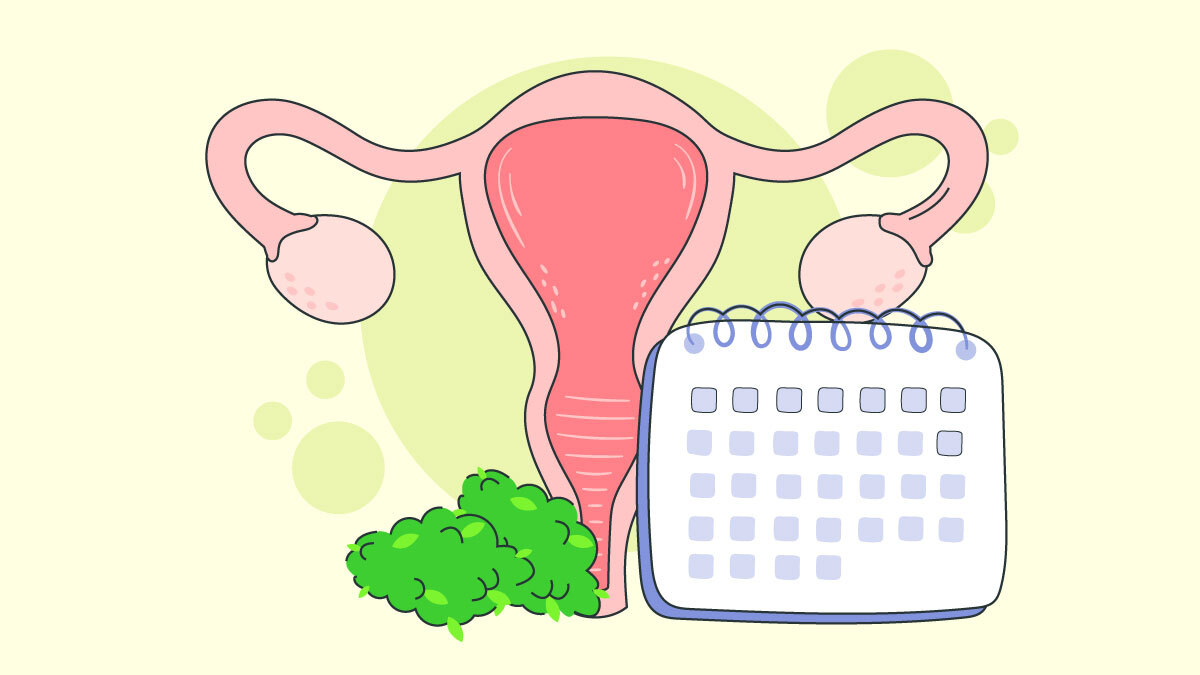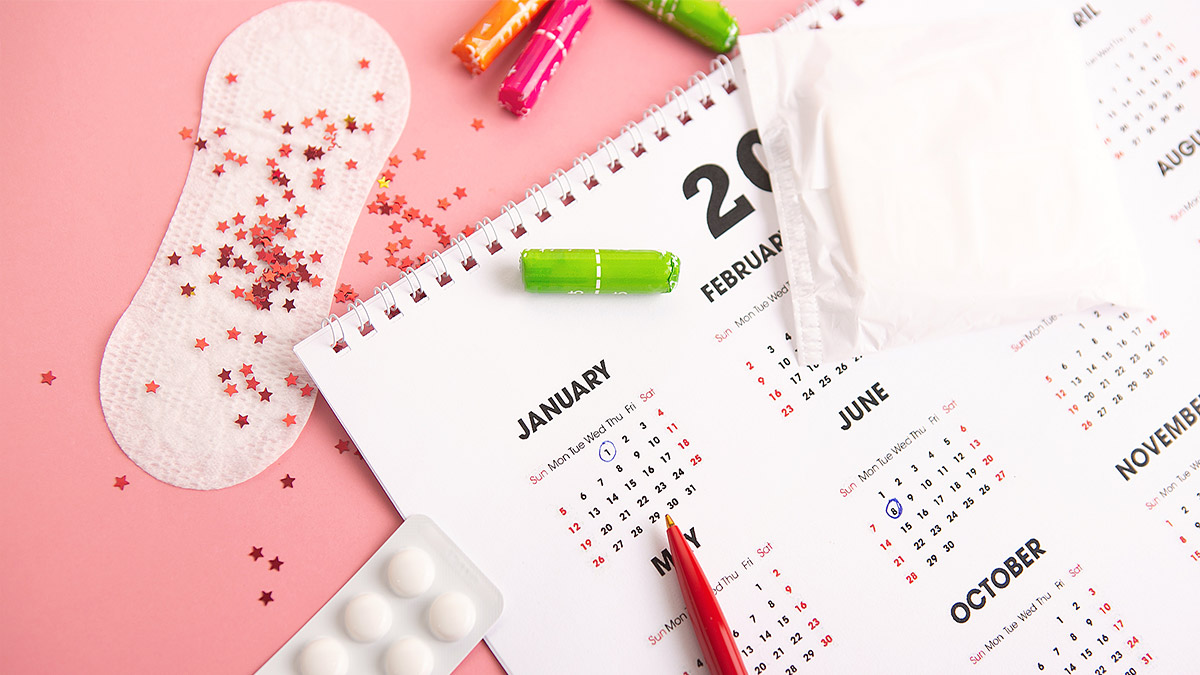Does Smoking Weed Affect Your Period?

Regular pot smokers are unlikely to check the calendar before they light up. But if they’re pre-menopausal women, should they?
That’s not as crazy as it sounds. The cannabinoids in weed, notably psychoactive THC and non-psychoactive CBD, deliver their effects by interacting with the body’s endocannabinoid receptors. Those receptors are integral parts of the endocannabinoid system (ECS), which controls most of our important bodily functions — including the female reproductive system.
And some ECS receptors are in the ovaries, where the female sex hormones estrogen and progesterone are produced.
So it makes sense to wonder whether smoking weed affects your period. Let’s look at the pros — and the potential cons — of smoking up when it’s that time of the month.
Weed and Menstrual Symptoms
Many people suffering from severe or chronic pain turn to marijuana for relief.
Study after study has shown the efficacy of cannabis as a treatment for a variety of pain issues, and the vast majority of medical marijuana patients in states like Colorado and Oregon are pain patients. Research also indicates that using cannabis, particularly at lower doses or with strains high in CBD content, may be an effective treatment for anxiety and depression.
That explains why many women use weed to help them deal with the pain that commonly accompanies the menstrual period, or to handle the depression that is associated with severe forms of PMS (premenstrual syndrome). One survey conducted at a university in British Columbia, where at the time only medical marijuana was legal, asked women if they’d used pot for menstrual pain. 85% of them said yes — and nearly 90% of that group said it was effective.
Smoking or using edibles to deal with the sometimes-disabling side effects of menstruation is certainly understandable. But that leads to an important question. Does smoking weed actually affect your period?
There is some research showing that it might. But the findings are far from conclusive.
Weed and PMS
Studies on the effect of cannabis on the menstrual cycle are few and far between. In fact, much of what we know was discovered back in the 1980s, and some of the research was done with rhesus monkeys, not humans.
First, a bit of biology. The 10-14 days after ovulation are known as the luteal phase of the menstrual cycle. Progesterone levels rise, estrogen levels begin to drop, and PMS symptoms appear in many women. Research has shown that severe issues during this period may be caused by unusually high levels of progesterone; supplemental progesterone may be prescribed to treat severe cases of PMS.
That brings us to one of the studies we’ve mentioned. It showed that THC may lower progesterone levels during the luteal phase, which could help explain why women who smoke or consume weed to combat the symptoms of PMS are likely to experience noticeable benefits.
That’s the unquestionably good news. Now, let’s talk about research results that aren’t quite as black-and-white; most of them involve the length of the menstrual cycle.
Weed and the Menstrual Cycle

One important 2015 study has found that weed use may lead to shorter periods. But we have to stop for a little more biology before getting to the details of that study.
A hormone we haven’t mentioned yet is luteinizing hormone (LH), which controls much of the menstrual cycle in women. LH triggers the release of an egg once every 28 days (or so). It also stimulates the production of progesterone during the luteal phase of the cycle.
Back to those study results. Researchers compared one group of women who regularly smoked both tobacco and marijuana, with another group that only smoked tobacco. It turned out that the luteal phase in those who consumed both substances was more than five days shorter than for those who smoked just cigarettes.
That’s not completely definitive, of course. They didn’t compare their findings with data for women who only smoked pot, or didn’t smoke anything at all. However, it’s one indication that smoking weed may shorten the menstrual period.
A different study, also done in the 1980s, showed somewhat-similar results. Researchers had one group of women smoke a joint containing one gram of cannabis (with a low 1.8% THC content) and had a “placebo” group smoke a tobacco cigarette.
They found that the weed smokers exhibited a 30% decrease in the production of luteinizing hormone, with the cigarette smokers showing no decrease in LH whatsoever. The study didn’t consider the length of those participants’ periods, but there’s a good possibility that THC had the same effect on period length as it did in the 2015 research.
The researchers who conducted that last study drew another important conclusion. Since LH is important to the reproductive system, they theorized that smoking cannabis could have adverse effects on women who want to become pregnant.
A 2016 review of that research, as well as several other studies that followed, confirmed that weed smokers are liable to have a shorter luteal phase. But it found much more than that.
Weed and Fertility
The research we just mentioned, published in the Yale Journal of Biology and Medicine, provided the first detailed explanation of why THC might have a major effect on the menstrual cycle and female reproductive health.
The lead researcher suggests that there’s a daisy-chain reaction when THC interacts with ECS receptors in the brain:
- First, THC suppresses the release of two hormones from the hypothalamus; they are gonadotropin-releasing hormone (GnRH) and thyrotropin hormone (TRH).
- GnRH and TRH are responsible for stimulating the release of hormones needed for regular menstruation and reproduction — and one of the hormones they’re responsible for is, you guessed it, luteinizing hormone. A deficit of GnRH and TRH means there will be a deficit of LH.
- Without enough LH, the female cycle is disrupted.
That may lead to even more issues, according to the study findings. Weed smokers could have longer-than-normal follicular phases, resulting in delayed ovulation — and they’re more likely to have so-called anovulatory cycles, in which they don’t ovulate at all.
Bottom line: women who smoke weed may not experience just “abnormal” periods. They are, in the study’s words, “at higher risk for decreased fertility.”
Should Pre-Menopausal Women Avoid Weed?
That’s a pretty broad conclusion to draw, particularly since there hasn’t been a lot of research dedicated to the subject. And then there’s this: the list of things that can affect menstrual cycles is a long one. It includes everything from smoking cigarettes and overindulging in alcohol, to eating red meat and sugar. Cannabis may just be one more item on the list.
The smart approach is to simply be aware of how smoking weed can affect your period — and to think about cutting back or temporarily taking a hiatus from the pot if you notice your cycle getting out of whack, or your PMS symptoms getting worse.
Does Smoking Weed Affect Your Period? FAQ
Q: Do different types of weed affect the menstrual cycle differently?
A: There’s no scientific information on that. But since the THC in weed appears to be the cause of possible menstrual effects, it would make sense that lower-potency strains would have less of an impact.
Q: Is luteinizing hormone the key to weed smokers’ disruptions in the menstrual cycle?
A: It seems to play a major role, but there are other theories, too. For example, THC has been shown to increase the body’s release of the stress hormone cortisol, and high cortisol levels have been linked to irregular, less frequent, or missed periods.
Q: Don’t men have luteinizing hormone as well? Does smoking weed affect their performance or fertility?
A: Yes, and apparently yes. Luteinizing hormone plays an important role in the male reproduction system; among other things, it stimulates the testicles to produce sperm. The limited available evidence indicates that cannabis use may cause a number of issues including lower sperm count, concentration, motility, and viability. There’s also been some research showing that smoking weed may affect sex drive and performance, too.
References
- Wiebe, E., Jaffar, S., Zelmer, J., & Byczko, B. (2015). Using marijuana to cope with the pain and other symptoms of medical abortions and menstrual periods. Contraception, 92(4), 402.
- Hill, K. P., Palastro, M. D., Johnson, B., & Ditre, J. W. (2017). Cannabis and pain: a clinical review. Cannabis and cannabinoid research, 2(1), 96-104. [2]
- Robson, P. (2001). Therapeutic aspects of cannabis and cannabinoids. The British Journal of Psychiatry, 178(2), 107-115.
- Grunberg, V. A., Cordova, K. A., Bidwell, L., & Ito, T. A. (2015). Can marijuana make it better? Prospective effects of marijuana and temperament on risk for anxiety and depression. Psychology of Addictive Behaviors, 29(3), 590.
- Joyce, K. M., Thompson, K., Good, K. P., Tibbo, P. G., O’Leary, M. E., Perrot, T. S., … & Stewart, S. H. (2021). The impact of depressed mood and coping motives on cannabis use quantity across the menstrual cycle in those with and without pre-menstrual dysphoric disorder. Addiction. [5]
- Walker, O. L. S., Holloway, A. C., & Raha, S. (2019). The role of the endocannabinoid system in female reproductive tissues. Journal of Ovarian Research, 12(1), 1-10. [6]
- Almirez, R. G., Smith, C. G., & Asch, R. H. (1983). The effects of marijuana extract and∆ 9-tetrahydrocannabinol on luteal function in the rhesus monkey. Fertility and sterility, 39(2), 212-217.
- Lammert, S., Harrison, K., Tosun, N., & Allen, S. (2018). Menstrual cycle in women who co-use marijuana and tobacco. Journal of addiction medicine, 12(3), 207. [8]
- Mendelson, J. H., Mello, N. K., Ellingboe, J. A. M. E. S., Skupny, A. S., Lex, B. W., & Griffin, M. A. R. G. A. R. E. T. (1986). Marihuana smoking suppresses luteinizing hormone in women. Journal of Pharmacology and Experimental Therapeutics, 237(3), 862-866.
- Brents, L. K. (2016). Focus: sex and gender health: Marijuana, the Endocannabinoid System, and the female reproductive system. The Yale journal of biology and medicine, 89(2), 175. [10]